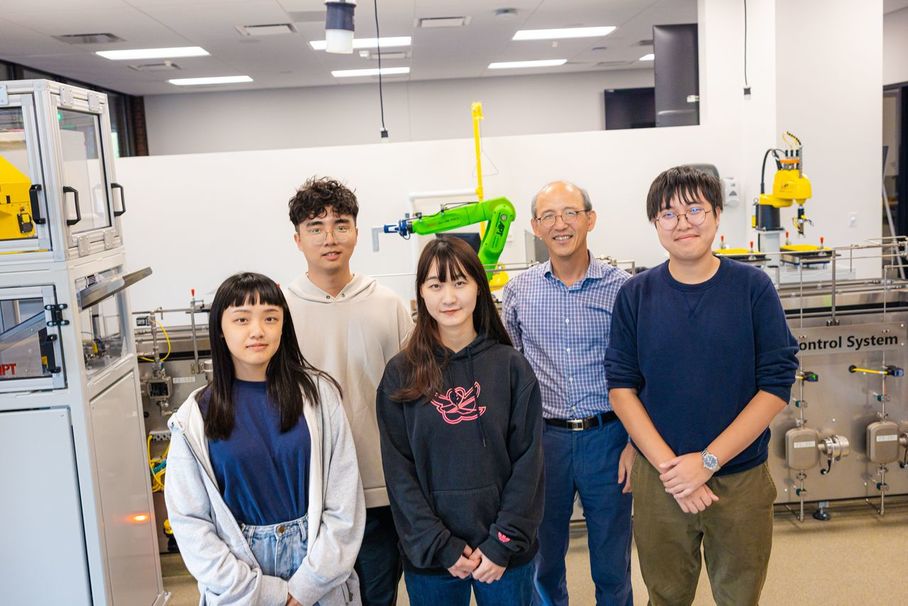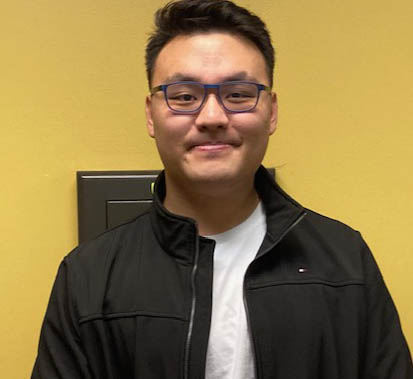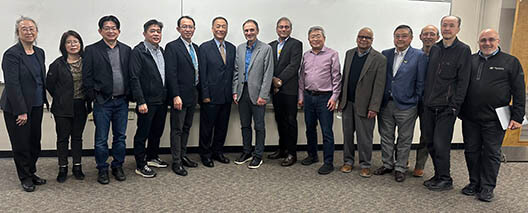A delegation from Chung Yuan Christian University (CYCU) in Taiwan visited UWM in May to tour research facilities and discuss potential expansion of the partnership the university has with the College of Engineering & Applied Science. CYCU has shared a dual master’s degree program with the College since fall of 2017.
Then, last fall, the partnership grew to include CYCU undergraduates who come here for their final two undergraduate years, called the 2+2 Program. Once completed, the credits they earn are transferrable to their home institution and students receive their degrees from both institutions.
This first 2+2 program cohort included 17 students, with 16 more enrolling at UWM for Fall 2024.
The CYCU trip here follows one made in February by Dean Brett Peters, UWM Provost Andrew Daire, Jennifer Gruenewald of the Center for International Education, and professor emeritus David Yu to CYCU and Chang Gung University (CGU), another institution in Taiwan that has an existing joint degree program with the College.
The College’s legacy of building strong partnerships with universities around the world continues to pay off this year, from record-breaking enrollment of international students from South Asia to talks of expanding ties with Taiwanese universities.
Global partners across campus
“Embracing international student and faculty research exchange is beneficial, not only because it enhances the academic culture, but also because the challenges facing society are global in scale,” said Dean Brett Peters. “The College has shown a commitment to fostering these global ties. But we’re also one part of a campuswide tradition at UWM.”
Of the 46 universities that UWM’s Center for International Education has listed as having an admissions agreement or dual degree program at UWM, 31 have a partnership with the College of Engineering. Now Daire is exploring whether some of the global partners with the College would be interested in extending their academic agreements with other UWM schools and colleges.

That was the situation when a partnership with CGU was forged in 2019, when dual programs were created at both the College and UWM’s Zilber School of Public Health. It includes undergraduate, non-degree exchange programs and dual graduate degree programs.Yu, professor emeritus, electrical engineering, worked with UWM’s Center for International Education and the Graduate School to form the College’s Asian partnerships.
Nurturing our relationships
“One lesson learned from our CYCU relationship is that it is not enough to sign a memorandum of understanding, but to attentively nurture our inter-institutional relationships through regular dialogue – and visits – between faculty and students,” said Prasenjit Guptasarma, associate dean for academic affairs at the College.
Guptasarma has travelled to nearly 15 universities in India in an effort to build and maintain UWM’s relationships there. Although the College also has students from Germany, Iran and China, among others, students from India represent the largest slice of enrollment from other countries.
In fall 2023, the College had 213 graduate students and 33 undergraduate from India, Bangladesh and Sri Lanka alone. Those numbers were rivaled at UWM only by similar South Asian enrollments in the Lubar School of Business.

An undergrad weighs in
Cheng Yu Yeh, a junior in computer science, chose to attend CYCU because it gave him the opportunity to participate in the new undergraduate joint program with UWM. He is excited to be in the first cohort of the new 2+2 program for undergraduates and hopes to work in the U.S. after graduation.
So far, he said, the coursework is more rigorous here than in Taiwan, but the larger class sizes at UWM give him the feeling that he is part of a learning community.
“In lecture courses here, we have to communicate with our classmates which is really good,” he said. “We don’t study on our own as much as we do in Taiwan. I feel that I’m learning much more.”
